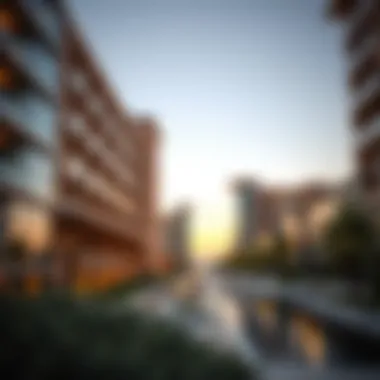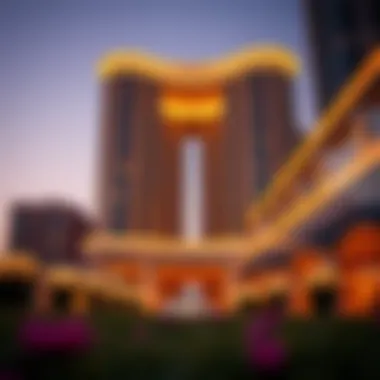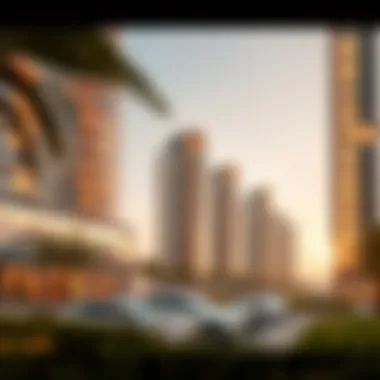Exploring New Developments in Dubai's Real Estate


Intro
Dubai's real estate market is like a dynamic kaleidoscope, ever-shifting and full of surprises. With its luxurious skyscrapers and thriving neighborhoods, this city continues to attract attention from homebuyers, investors, and expats alike. In recent years, a wave of upcoming projects has begun to surface, promising to reshape the property landscape. A closer look at these developments reveals underlying trends, potential investment opportunities, and a commitment to sustainability that reflects Dubai's vision for the future.
As the market evolves, understanding what lies ahead becomes crucial for anyone looking to engage in this vibrant sector. This article provides an in-depth analysis of the current projects on the horizon. We will discuss critical market trends, investment strategies, and the implications these new developments may have on Dubai's property values and urban infrastructure. Whether one is a seasoned investor or a first-time buyer, the insights found here will be invaluable in navigating the complexities of this booming market.
Market Overview of Dubai's Real Estate
Understanding the market landscape of Dubai's real estate sector is critical for anyone involved in property investment or development. This overview acts as a compass, guiding stakeholders through the complexities of a robust and dynamic marketplace. As Dubai continues to solidify its reputation as a global business hub, examining its real estate market offers insights into emerging trends, economic influences, and potential investment opportunities.
The real estate sector in Dubai is not just about buying and selling land or property; it's about analyzing a thriving ecosystem that encompasses a range of factors, from governmental policies to evolving consumer preferences. This section aims to distill critical elements pertaining to market movements, the effects of economic conditions, and the upcoming projects that are setting the stage for future growth.
Current Trends in Real Estate
In recent years, the real estate market in Dubai has seen some transformative changes. Property values have fluctuated, influenced by various elements, including economic conditions, consumer sentiment, and global trends. Some notable trends currently shaping the landscape include:
- Increased Demand for Mixed-Use Developments: More buyers and investors are gravitating towards projects that blend residential, commercial, and leisure spaces. These developments often provide a more integrated living experience, encapsulating the idea of livable cities.
- Sustainability Initiatives: Developers are increasingly incorporating environmentally friendly practices into their projects. This focus not only caters to a growing demographic of eco-conscious buyers but also aligns with Dubai’s broader vision for a sustainable future.
- Tech-Driven Real Estate: The use of technology in property management, buying, and selling is becoming more prevalent. Innovations in PropTech are reshaping how transactions occur, further enhancing efficiency.
In short, the shift towards well-rounded, sustainable, and tech-integrated properties reflects a broader commitment to not only meeting buyer expectations but elevating the overall living experience in the city.
Economic Factors Influencing Growth
Economic indicators play a significant role in shaping the trajectory of Dubai's real estate. One can't overlook the influence of the global markets and geopolitical changes, as these can have immediate impacts on local investment sentiment. Delving deeper, several economic factors stand out:
- Foreign Investment Influx: Dubai has long been a magnet for foreign investors, thanks to its relatively favorable tax framework and high return on investment potential. Economic stability and growth prospects continue to attract overseas capital, which is vital for property development.
- Tourism Growth: The tourism sector remains a heavyweight player in the Dubai economy. Events such as Expo 2020 have further boosted visitor numbers, leading to increased demand for short-term rental properties and hotels, driving up real estate prices in specific markets.
- Employment Trends: The creation of new jobs in diverse sectors has bolstered buying power among residents, particularly expatriates. Job growth fuels demand for housing, both rental and owned.
"The intricacies of the economy are not merely numbers on a page; they represent the lifeblood of the market, influencing everything from demand to pricing."
Major Upcoming Developments
In the bustling landscape of Dubai's real estate, major upcoming developments play a pivotal role in shaping the future of the market. With a skyline that constantly evolves, these projects are more than mere constructions; they symbolize economic growth and represent shifting demographics. Their importance cannot be overstated, as they cater to a diverse array of homebuyers, investors, and businesses, offering living spaces and commercial environments that resonate with the vibrancy of the emirate. By understanding the intricacies of these developments, one can gain insights into Dubai's broader economic environment and social trends.
Residential Projects
Residential projects form the backbone of any thriving real estate market. In Dubai, where expatriates account for a significant portion of the population, the demand for various types of residential spaces is robust. Developers are focusing on creating homes that are not only stylish but also functional and accommodating to diverse lifestyles.
Key Residential Complexes
When we talk about key residential complexes in Dubai, we inevitably dive into neighborhoods that blend luxury and convenience. These complexes are often strategically located near amenities such as schools, hospitals, and entertainment venues, thus ensuring a comprehensive lifestyle for residents. An example worth mentioning is the Dubai Creek Harbour, which is touted as a game changer in urban living.
One standout feature is the incorporation of green spaces, which enhances the aesthetic while providing residents with recreational areas. This trend towards eco-friendly living is becoming increasingly popular and attracts buyers looking for a wholesome community experience. However, the flip side can be the cost. With these features often driving up prices, it can be a double-edged sword. Families may have to balance amenity-rich living against their budget.
Luxury vs. Affordable Housing
The debate between luxury and affordable housing is a constant in Dubai's real estate conversations. Luxury developments, such as those in Palm Jumeirah, promise opulence along with the added benefit of exclusivity. Buyers are often attracted to high-end features like private pools, concierge services, and stunning views of the Arabian Gulf. On the downside, the price point remains lofty, frequently out of reach for the average family.
In contrast, affordable housing initiatives aim to cater to the growing middle class and expatriates looking for a place to call home without breaking the bank. Projects like Dubai South offer a more budget-friendly solution without sacrificing quality. Here, buyers can find reasonably priced housing options that still maintain a strong community feel, making it appealing from a financial and lifestyle perspective. However, it’s vital to consider that affordability sometimes comes at the cost of location and size.
Commercial Projects
Commercial projects are essential for any city's growth, serving as economic catalysts that foster job creation. Dubai's commercial real estate is equally dynamic, adapting to the needs of a burgeoning workforce and offering modern office spaces to attract businesses worldwide.
New Office Spaces
The emergence of new office spaces is a direct response to the evolving work culture. Developers are creating workplaces that are not just buildings but environments that inspire creativity and collaboration. Spaces in places like Dubai Design District emphasize flexibility, with co-working areas that cater to freelancers and start-ups alike.
These modern office configurations are designed with amenities that enhance productivity, like tech-friendly infrastructure and wellness rooms. Nonetheless, the drawback for some new entrants in the market may be the higher costs associated with premium locations and contemporary design features.
Retail Developments
Retail developments are equally significant. They contribute not only to the economy but also to the social fabric of Dubai, offering spaces where people can gather, shop, and socialize. Projects like Mall of the World are ambitious in their vision, promising vast retail experiences that draw shopping enthusiasts from near and far.
What makes such retail hubs attractive is their potential to combine shopping with entertainment, creating a holistic experience for visitors. However, with the rise of online shopping, physical retailers often face challenges in capturing foot traffic, and finding ways to entice customers back into stores remains a critical challenge.


Mixed-Use Developments
Lastly, mixed-use developments symbolize a forward-thinking approach to urban planning, combining residential, commercial, and leisure spaces into one cohesive project. These developments aim to create vibrant communities where living, working, and leisure seamlessly integrate. With projects like Jumeirah Central, Dubai is poised to redefine urban living, fostering a sense of belonging and community engagement. They hold the promise of making life easier for residents, who can enjoy amenities without traveling far.
Through this exploration of major upcoming developments, we see how each project aims to address specific needs within Dubai’s diverse population. Whether it's the luxury seeker or the average family, the variety enhances choices and shapes the future of this ever-evolving city.
Sustainability in New Projects
Sustainability in new projects is no longer just a buzzword; it’s a necessity in Dubai’s rapidly transforming real estate landscape. With the city aiming to create a model for urban sustainability, new developments are increasingly designed with eco-friendly features and long-term efficiency in mind. The benefits of prioritizing sustainability range from reducing environmental impact to enhancing property values and attracting a conscientious demographic.
Investment in sustainable projects promises not just aesthetic appeal but also resilience against future urban challenges. As Dubai dives into implementing forward-thinking solutions, understanding the relevance of sustainability becomes essential for homebuyers, investors, and urban planners alike.
Green Building Initiatives
Green building initiatives play a critical role in exemplifying sustainability in Dubai's real estate sector. These initiatives prioritize energy efficiency, water conservation, and improved indoor air quality through innovative design and construction practices. For instance, using materials that are locally sourced not only minimizes environmental footprints but also supports local economies.
Key features of green building initiatives include:
- Energy-efficient systems: New projects often integrate solar panels and green roofs, significantly reducing energy consumption.
- Water-saving technologies: Installation of low-flow fixtures and greywater recycling systems creates a balance that minimizes waste.
- Enhanced insulation: Advanced materials ensure that buildings remain energy efficient throughout the year, reducing the reliance on air conditioning.
"Green buildings can reduce energy costs by 30% or more, providing significant savings to owners and residents, while contributing to a healthier environment."
These elements not only help in conserving resources but also hold the potential to increase the attractiveness of properties on the market, leading to heightened investment interest.
Sustainable Urban Planning
Sustainable urban planning is the backbone of any thriving city’s infrastructure, and it’s particularly pertinent in a city like Dubai, which is fostering rapid development. Thoughtful urban planning involves integrating mixed-use developments, public transportation options, and green spaces that foster community engagement.
Considerations within sustainable urban planning include:
- Mixed-use spaces: These areas serve dual purposes, reducing the need for extensive commuting and promoting community interaction.
- Efficient public transport: The development of efficient mass transit systems, such as the Dubai Metro, ensures connectivity and reduces reliance on individual cars, contributing to lower carbon emissions.
- Community spaces: Parks and recreational areas improve quality of life, providing residents with places to socialize and engage with nature.
With the emphasis on sustainability, urban planners in Dubai are not simply building for today but are crafting spaces that will endure for generations. This forward-thinking approach encourages a proactive stance toward environmental challenges, maintaining the balance between development and ecological preservation.
Investment Opportunities
The real estate market in Dubai is a juggernaut, continually evolving and filled with diverse investment opportunities. Investors eyeing Dubai must delve into this vibrant market to uncover avenues that can lead to substantial returns. With growth fueled by a mix of economic factors, government policies, and innovative projects, understanding these investment opportunities becomes paramount, especially for homebuyers, seasoned investors, agents, analysts, and expats.
One of the primary reasons why investing in Dubai’s real estate is appealing is the potential for high returns on investment (ROI). Properties in well-planned areas often appreciate significantly over time, making them a lucrative option for buyers looking to capitalize on the market fluctuations. Notably, some areas like Dubai Marina and Downtown Dubai have seen property values skyrocket, driven by demand and infrastructural enhancements. Therefore, potential investors should keep a keen eye on hot spots that show signs of growth.
Another critical element looking towards investment opportunities is the diverse range of property types available. From luxurious villas in Emirates Hills to affordable apartments in Dubai Sports City, there's something for everyone. This variety allows investors to tailor their portfolios according to their risk appetite and investment horizon. Moreover, the introduction of flexible payment plans and the trend towards off-plan selling can further encourage entry into the market by reducing initial capital outlay.
When evaluating potential investments, it’s also essential to consider the impact of government incentives. The UAE government has put forth several initiatives to attract foreign investment, including long-term residency options, tax exemptions, and ownership rights, which can positively influence property demand. These policies not only support the market but also provide a safety net for investors seeking long-term stability.
Key Considerations for Potential Investors:
- Location, Location, Location: Identify areas with future development plans.
- Market Trends: Understanding seasonal and economic cycles can aid in timing investments.
- Legal Framework: Being informed about the legalities surrounding property ownership for foreigners is crucial.
"Investing in Dubai real estate isn’t just about purchasing properties; it’s about understanding the larger ecosystem that drives these investments."
Understanding the nuances of these factors will help potential investors make informed decisions while navigating Dubai's lively real estate landscape.
Analyzing ROI
When it comes to assessing potential real estate investments, analyzing ROI can be the make-or-break factor for many investors. In Dubai, many individuals enter the market with a robust investment strategy focused on maximizing returns. Essentially, ROI can be computed by taking the net profit from a property and dividing it by the total investment. Net profit would typically include rental income minus expenses such as maintenance, management fees, and any applicable taxes.
Investors willing to dive deep into the ROI figures should encompass the gross rental yield as a starting point. A yield of 8-10% is generally considered favorable in Dubai, especially in established areas with high rental demand. Moreover, it’s essential to account for appreciation potential, which could significantly augment overall returns.
Where potential investors may falter is underestimating factors affecting rental yield over time. For instance, new properties often have competitive pricing leading to initial lower yields. However, understanding local demand and future development plans becomes vital as markets mature and attract more buyers.
Risks vs. Rewards
Every investment comes with its set of risks, and the Dubai real estate market is no exception. Understanding the risks involved can help investors safeguard their interests while navigating this often-lucrative landscape. Market fluctuations, regulatory changes, and ongoing geopolitical factors can significantly impact property values and occupancy rates. It’s crucial for investors to conduct thorough research and stay abreast of market trends to mitigate these risks.


Conversely, the rewards of investing in Dubai's real estate can be staggering. With rapid population growth, infrastructure development, and ongoing diversification of the economy, the long-term outlook remains promising. Furthermore, certain areas in Dubai are undergoing substantial transformations due to government-backed mega-projects, which can drive prices substantially higher in the long run. For instance, areas undergoing revitalization like Deira and Dubai Creek Harbour showcase the city’s commitment to ushering in transformative urban spaces.
As investors weigh risks against potential rewards, resourceful analysis and market insight are indispensable. It's vital to approach investment not only with a clear strategy but also an understanding of personal financial goals and market conditions.
The Role of Government Policies
The role of government policies plays a crucial part in shaping the dynamics of Dubai's real estate market. Regulations and incentives not only impact the frameworks within which developers operate but also establish a conducive environment for investors looking to capitalize on emerging opportunities. To fully grasp the nuances of these policies is to understand the lifeblood of the market itself.
Government policies have become pivotal in supporting the ongoing growth of Dubai's property sector. As the emirate seeks to position itself as a global hub, proactive measures are aimed at attracting foreign investment, enhancing sustainability, and facilitating innovation. The impact of these regulations goes beyond simple compliance; they increase investor confidence, and in turn, stimulate demand. It's akin to pouring water onto a plant; beneficial policies nurture growth in a volatile climate.
Regulations Affecting Development
Regulations encompass a broad spectrum of guidelines, from zoning laws to building codes, which govern how and where developments can occur. In Dubai, the municipality is often at the helm of setting these regulations, tailoring them to meet both the current needs and future vision of the city. These zoning laws can dictate everything from the height of buildings to the types of commercial activities allowed in specific areas.
The most significant regulations include:
- Land Use Planning: This ensures that developments contribute not just to the economy but to community wellbeing.
- Building Safety Standards: Compliance with strict safety codes guarantees the security of future residents and users.
- Permitting Processes: Streamlined processes help encourage quicker project turnaround, further attracting international developers to the region.
One important aspect is the gradual shift towards sustainability-related regulations. With initiatives leaning toward green building practices, new projects must meet certain criteria which not only enhance their appeal but align with global environmental standards. The regulations are a reflection of the city's ambition for a sustainable future.
Incentives for Investors
Incentives are a game-changer for investors, especially in a marketplace as competitive as Dubai's. The government offers a slew of benefits to attract investment not just from within the region but globally. This includes:
- Tax Exemptions: Many projects enjoy favorable tax structures that decrease overhead costs for investors.
- Freehold Ownership: In certain areas, foreign nationals can obtain full ownership rights, allowing them to invest without regional partners.
- Long-term Visas for Investors: Recent policies allow property investors to secure long-term residency, making Dubai an attractive destination for those looking to establish roots.
Another noteworthy incentive includes the introduction of various financing options that ease the entry barriers for investors new to the market. Access to mortgage loans with minimal down payments can be a deciding factor for potential buyers. Overall, these incentives create a fluid economic environment that encourages more stakeholders to join the fray, enriching the diversity and vibrancy of the market.
"A supportive regulatory environment serves as both a catalyst for growth and a hedge against market volatility."
In summary, government policies in Dubai’s real estate market are not merely bureaucratic necessities but rather strategic tools that shape development trajectories. By regulating effectively while providing lucrative incentives, authorities foster an atmosphere of confidence that ultimately benefits developers, investors, and the community alike. As we look to the future, understanding these policies is vital for anyone considering entering the market, whether as a homebuyer or a savvy investor.
Impact of Technological Innovations
In the realm of real estate, particularly in a fast-evolving market like Dubai, the influence of technological innovations cannot be overstated. The impact goes beyond just enhancement of property management; it shapes the entire landscape of urban development and community living. As we delve into the upcoming projects in Dubai, we will witness how technology plays a pivotal role in transforming both residential and commercial sectors. Key benefits of this transformation include increased efficiency, improved sustainability, and heightened engagement between communities and property developers.
Smart Cities Concept
The emergence of the smart cities concept is a linchpin in Dubai’s future development. A smart city integrates various digital technologies to enhance performance in areas like urban mobility, energy management, and public safety. For instance, projects like Dubai’s Smart Dubai initiative aim to incorporate technologies such as the Internet of Things (IoT), big data analytics, and artificial intelligence to create a seamless living experience. This entails everything from intelligent traffic systems that minimize congestion to energy-saving measures that reduce the carbon footprint of buildings.
- Enhanced Infrastructure: Smart technologies facilitate real-time monitoring of infrastructure health, which can predict maintenance needs before they become critical.
- Sustainable Solutions: By deploying smart waste management systems, cities can streamline waste collection, reducing resource consumption and promoting recycling.
- Public Engagement: With apps connecting residents to city services, citizens feel a stronger sense of involvement, leading to enhanced community morale and cooperation.
It is easy to see how these advances not only improve daily life but also attract international investment and develop a robust, resilient urban framework.
PropTech in Dubai
The intersection of real estate and technology, often referred to as PropTech, is burgeoning in Dubai. Emerging PropTech solutions are revolutionizing how buyers, sellers, and agents interact in the property market. For instance, virtual reality (VR) and augmented reality (AR) enable potential buyers to view properties in immersive ways without having to step foot inside. This is particularly beneficial in Dubai, where many international buyers rely on digital resources to make informed decisions.
- Digital Platforms: There are platforms dedicated to real estate transactions, allowing users to list or browse properties conveniently. Websites like propertyfinder.ae and dubizzle.com showcase how online transactions are becoming mainstream.
- Data Analytics: Cutting-edge technology aids agents in interpreting market trends, providing invaluable insights into pricing strategies and buyer behaviors.
- Blockchain Implementation: The usage of blockchain technology in the real estate sector minimizes risk by ensuring transparent and secure transactions, which is a tremendous benefit for investors looking at long-term gains.
By combining smart technologies and PropTech applications, Dubai’s real estate market is not just reacting to trends but forging a future where these innovations are integral to every phase of property development and transaction, positively impacting all stakeholders involved.
"The integration of technology in real estate represents not just a trend but a fundamental shift that can redefine urban living in a way that is more sustainable and enjoyable for everyone."
This promising landscape invites both local and international entities to take a closer look at the ongoing transformations, assuring the experience for future residents will be marked by efficiency and advanced connectivity.
Cultural and Lifestyle Aspects
Exploring cultural and lifestyle factors is essential when sifting through the emerging real estate projects in Dubai. These are not merely novelties; they are key elements that shape the allure of living and investing in this bustling city. Understanding the local culture can provide insights into buyer preferences and aspirations, as the city is a melting pot of traditions, modernity, and innovation that appeals to a variety of demographics.
Demographic Changes
Demographic shifts play a crucial role in how real estate is evolving in Dubai. The city has seen a notable uptick in its expatriate population, which diversifies the market and influences various aspects of buying and renting properties. Young professionals, families seeking better educational opportunities, and retirees looking for a cosmopolitan lifestyle are constantly reshaping the demographic landscape.


Consider this: areas that were once dominated by expatriates are now witnessing significant numbers of Emirati families moving in. This shift leads to a demand for different types of residential units, with community amenities like parks, schools, and grocery stores gaining more importance. Consequently, property developers are now catering to a mixed demographic, ensuring that residential environments are not just livable but also resonate with the cultural dynamics of its residents. By paying attention to these demographic changes, developers can better align their projects to attract potential buyers, ultimately impacting long-term investment success.
Community Engagement in New Developments
Community engagement has a lasting impact on how new developments are perceived and integrated into the urban fabric of Dubai. The role of builders and developers extends beyond constructing buildings; they are now viewed as vital players in fostering connections between residents.
An increasing number of projects are incorporating communal spaces designed for social interactions—community pools, parks, and even vibrant marketplaces. By creating spaces that nurture community bonds, developers can directly influence lifestyle quality for residents, which, in turn, boosts property values.
"A thriving community is more than just a grouping of houses; it’s a network of relationships that enrich lives."
Moreover, local authorities often encourage developers to include cultural initiatives, such as art installations or public events, that celebrate the diverse heritage of the city. For example, the inclusion of local marketplaces within residential developments not only supports small businesses but also provides a platform for cultural exchange.
These engagements are not just vital for social cohesion; they also contribute to a project's marketability and desirability. Buyers today are not only investing in property but also in a lifestyle that promises community, interaction, and cultural richness. As such, the ongoing dialogue between developers and the community can create a lasting impact on the broader real estate market in Dubai.
In summary, understanding cultural and lifestyle aspects, alongside demographic dynamics and community engagement, helps illuminate the nuanced landscape of Dubai's real estate scene. It enables stakeholders to make wiser, well-informed decisions tailored to the evolving desires and expectations of residents and investors alike.
This multifaceted approach ensures that the developments not only meet current market demands but also pave the way for a vibrant future, enhancing the overall appeal of Dubai's property sector.
Case Studies of Successful Projects
When navigating Dubai's complex real estate market, understanding the successes of past projects becomes crucial. Case studies of successful projects serve as a window into what strategies work well and what pitfalls to avoid. These insights are not just educational; they can directly influence decision-making for prospective investors, homebuyers, and real estate agents.
The examination of previous developments in the emirate helps to shed light on specific elements such as design, location, community engagement, and market trends that have contributed to the success of these projects. Moreover, it provides a blueprint for the enhancements needed in future endeavors.
A case study can illuminate the benefits of meticulous planning and execution. This is especially true in a market as dynamic and multifaceted as Dubai, where each corner has its own story.
Notable Examples
Learnings from Past Developments
One of the standout aspects of learnings from past developments is the emphasis on community integration. Projects like Dubai Marina not only considered residential units but also harmoniously integrated parks, shopping centers, and leisure facilities that cater to both residents and tourists. This characteristic of blending lifestyles is key, as it enhances livability and increases property demand.
The success of the Burj Khalifa, which incorporates both residential, commercial, and hotel spaces, demonstrates the unique approach of mixed-use development. The learning here is that diverse offerings in a single location create a draw for multiple types of investors and residents. Ultimately, this multifaceted strategy fosters a thriving community, making it a beneficial concept worth emphasizing in our exploration of Dubai's upcoming projects.
However, it's important to note some drawbacks; not every mixed-use project replicates the success of Burj Khalifa. Misjudgments in understanding market needs can lead to oversupply, as seen in certain developments that were built without considering buyer preferences.
Impact on the Market
Shifting gears, let's discuss the impact on the market as a result of successful projects. When a project achieves notable success, it tends to uplift nearby property values and incite further developments. For instance, the rapid rise in demand around the Downtown area after the Burj Khalifa's completion sent ripples throughout Dubai's real estate market.
One key characteristic here is the phenomenon of gentrification that often occurs as surrounding areas benefit from increased attention and investment. This widespread impact makes it appealing for stakeholders to learn from these examples.
On the flip side, such rapid growth can pose challenges as well, like over-inflated property prices forcing some residents to the outskirts. Balancing this impact is essential for sustainable urban growth in Dubai. A thorough understanding of these dynamics is indispensable for anyone looking to navigate the market successfully.
"Knowledge gained from successful projects shapes the strategies of tomorrow's developments."
For further exploration, consider checking resources like Wikipedia, or industry insights on Reddit. Search for information from official websites like those ending in .gov or .edu for credible resources that discuss Dubai's evolving market.
Future Perspectives
Understanding the future of Dubai's real estate market isn't just a matter of predicting numbers or trends. It's about grasping how the shifting sands of consumer behavior, economic factors, and advancements in technology intertwine to shape the landscape of urban development. The properties currently on the drawing board may redefine living, working, and investing in this bustling metropolis. This section highlights key elements that will influence the market, offering insights and foresight that can significantly benefit homebuyers, investors, agents, and analysts alike.
In this continually evolving market, the benefits of studying future perspectives extend beyond mere speculation. For investors, it means identifying potential hotspots before they come into the limelight. Homebuyers can anticipate their needs in aligning with upcoming developments. Moreover, agents will have a clearer view of facilitating transactions as they align their strategies with shifting consumer preferences and market dynamics.
Long-term Market Predictions
Predicting the long-term trends of Dubai's real estate market requires weighing various factors — economic stability, population growth, technological advancements, and even geo-political influences. As of now, many analysts foresee a stabilization in property prices after years of fluctuations. With infrastructure developments like the expansion of the Dubai Metro and initiatives associated with the Expo 2020 legacy, certain areas are likely to see an uptick in demand.
Also, regionally, Dubai's mission towards a diversified economy marks a robust pivot. The growing emphasis on sectors like technology, finance, and tourism strengthens real estate investments, making the market more resilient to economic shocks. As a result, predictions suggest that high-quality developments with sustainable features will emerge as prime options for long-term investments.
"Predictive models show that areas incorporating eco-friendly initiatives are likely to become real estate goldmines in the coming years."
Evolving Consumer Preferences
Consumer preferences in Dubai's real estate market are shifting like the wind. The recent years reflected a notable trend towards larger living spaces, as families prefer apartments and homes that offer comfort and room for growth. A more health-oriented lifestyle has also emerged, with many buyers looking for properties in developments close to parks, gyms, and wellness facilities. Additionally, the ultra-urban professionals are favoring units in mixed-use developments where they can work, live, and play all in one place.
Moreover, the millennial cohort and younger generations are placing a premium on sustainability. They want smart homes equipped with energy-efficient technologies and easy access to public transportation. Knowing these trends enables stakeholders to tailor their offerings to match potential buyers' desires.
Understanding these evolving preferences not only helps in meeting market demands but also positions stakeholders ahead of the curve. It’s all about staying in tune with what people want, adapting swiftly when the market shifts.
In summary, recognizing the forthcoming changes in consumer preferences and market predictions will empower stakeholders in Dubai's real estate arena to navigate the complexities of this vibrant landscape effectively. By preparing for these shifts, they can position themselves for success in this multifaceted sector.







